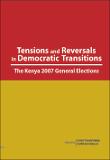Voting without institutionalized political parties: Primaries, manifestos and the 2007 general elections in Kenya
Abstract/
This chapter discusses the impact of institutional capacity of political parties on the organization of party primaries and formulation of manifestos for the 2007 general elections in Kenya. The discussion also assesses the extent to which political parties are advancing the democratization agenda in the country. Formal institutional perspective assumes that for political parties to effectively oversee the democratization project, they ought to be institutionalized. To the contrary, political parties in Kenya do not operate as formal institutions; political elites form them as convenient and temporary tools to access or retain power. Thus, parties have always been transformed, dissolved and recreated with each successive election. It is this little institutionalization that saw party primaries in the 2007 elections, particularly at the civic and parliamentary levels, marred by chaos, fraud, bribery, ethnicity, incivility and violence that undermined intra-party democracy. Some party manifestos ended up being formulated from the party leader’s personal lens of winning the election, while other manifestos were significantly similar. The discussion concludes that lack of institutionalization of political parties has severely subverted democratization in Kenya. Nevertheless, the recently enacted Political Parties Act 2007 contains fundamental provisions which, if implemented, may go a long way in strengthening these quintessential instruments of democracy.

